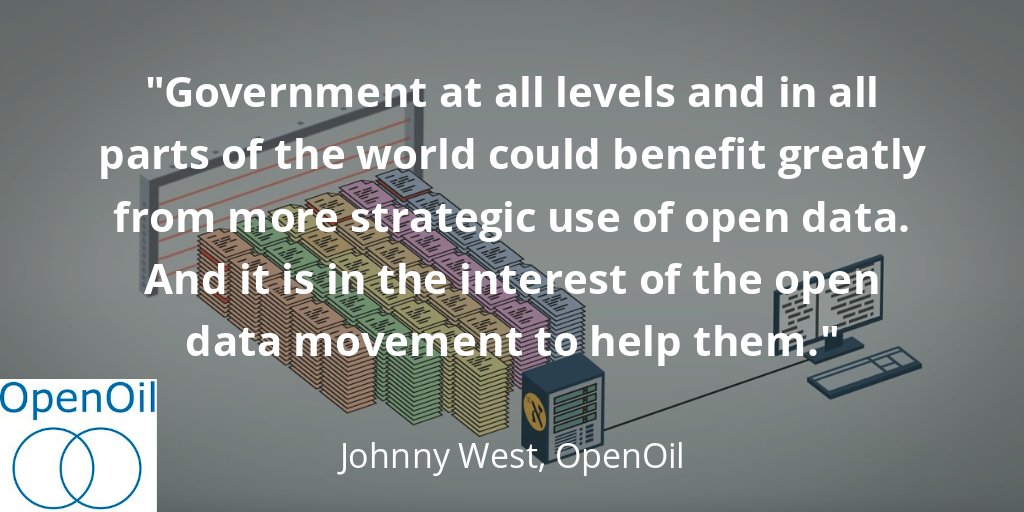Here’s an open data story that might sound a bit counterintuitive.
Last month a multinational company was negotiating with an African government to buy an asset. The company, which already owned some of the asset but wanted to increase its stake, said the extra part was worth $6 million. The government’s advisers said it was worth at least three times that. The company disputed that. The two sides met for two days and traded arguments, sometimes with raised voices, but the meeting broke up inconclusively.
A week later, half way round the world, the company’s headquarters issued a new investor presentation. Like all publicly listed companies, its release was filed with the appropriate stock market regulator, and sent out by email newsletter. Where a government adviser picked it up. In it, the company advertised to investors how it had increased the value of its asset – the asset discussed in Africa – by four times in 18 months, and gave a valuation of the asset now. Their own valuation, it turned out, was indeed roughly three times the $6 million the company had told the government it was worth. Probably, the negotiators were not in touch with the investor relations people. But the end result was that the company had blown its negotiating position because, in effect, as a whole institution, it didn’t think a small African government could understand disclosure practise on an international stock market, subscribe to newsletters, or read their website.
The moral of the story is: we need to expand the way we think about governments and open data. In the existing paradigm, governments are seen as the targets of advocacy campaigns, to release data they hold for public good, and enact legislation which binds themselves, and others, to release. Civil society tries hunts for internal champions within government, international initiatives (EITI, OGP etc) seek to bind governments in to emergent best practise, and investigative journalists and whistleblowers highlight the need for better information by dramatic cases of all the stuff that goes wrong and is covered up.
And all of that is as it should be.
But what we see regularly in our work at OpenOil is that there is also huge potential to engage government – at all levels – as users of open data. Officials in senior positions are sitting day after day, month after month, trying to make difficult decisions, under the false impression that they have little or no data. Often they don’t have clear understanding and access to data produced by other parts of their own government, and they are unaware of the host of broader datasets and systems. Initiatives like EITI which were founded to serve the public interest in data around natural resources have found a new and receptive audience in various government departments seeking to get a joined up view of their own data.
And imagine if governments were regular and systematic users of open data and knowledge systems, how it might affect their interaction with advocacy campaigns. Suddenly, this would not be a one way street – governments would be getting something out of open data, not just responding to what, from their perspective, often seems like the incessant demands of activists. It could become more of a mutual backscratching dynamic.
There is a paradox at the heart of much government thinking about information. In institutions with secretive cultures, there can be a weird ellipsis of the mind in which information which is secret must be important, and information which is open must be, by definition, worthless. Working on commercial analysis of assets managed by governments, we often find senior officials who believe they can’t make any progress because their commercial partners, the multinationals, hold all the data and don’t release it. While it is true that there is a stark asymmetry of information, we have half a dozen cases where the questions the government needed to answer could be addressed by data downloadable from the Internet. You have to know where to look of course. But it’s not rocket science. In one case, a finance ministry official had all the government’s “secret” data sitting on his laptop but we decided to go ahead and model a major mining project using public statements by the company anyway because the permissions needed from multiple departments to show the data to anyone else, let alone incorporate them in a model which might be published, would take months or years.
Of course reliance on open data is likely to leave gaps and involves careful questions of interpretation. But our experience is that these have never been “deal breakers” – we have never had to abandon an analytical project because we couldn’t achieve good enough results with public data. Because the test of any analytical project is not “is it perfect?” but “does it take us on from where we are now, and can we comfortably state what we think the margins of error are?”.
The potential is not confined to the Global South. Government at all levels and in all parts of the world could benefit greatly from more strategic use of open data. And it is in the interest of the open data movement to help them.

Johnny West is director of OpenOil, a Berlin-based consultancy which uses open data and methodologies to build investment-grade financial and commercial analysis for governments and societies of their natural resource assets. He sits on the Advisory Board of FAST, the only open source financial modelling standard, is an alumnus of the Shuttleworth Foundation Fellowship and serves a member of the Open Knowledge Foundation Board of Directors.








